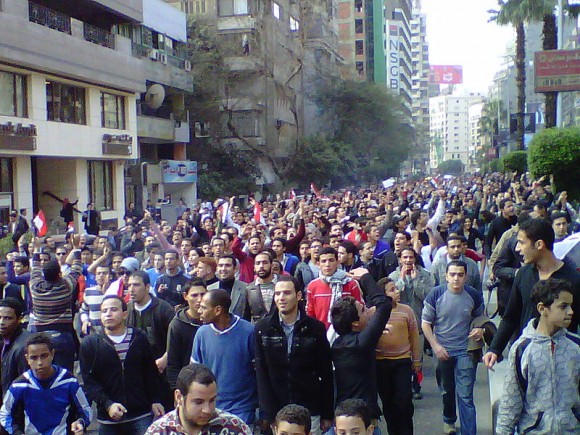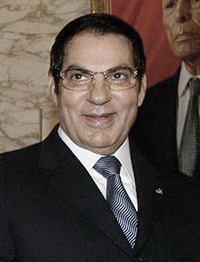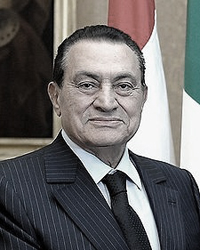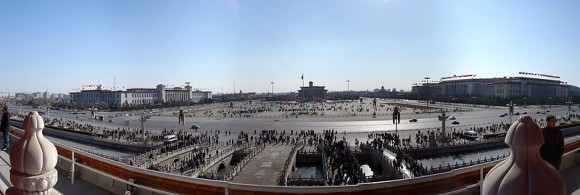THE Egypt protests have dominated prime-time news for over two weeks now. After 30 years in power and initially refusing to accede to protestors‘ demands for him to leave, President Hosni Mubarak resigned on 11 Feb 2011 after 18 days of nationwide demonstrations. Meanwhile, Prime Minister Datuk Seri Najib Razak warned Malaysians that demonstrations would not be allowed to bring down the government, as has happened in other countries. He also said that since Malaysians have the freedom to choose the government of their choice, there is no need to usurp power.
How close, or how far, is Malaysia from becoming Egypt? The Nut Graph asks political scientist Wong Chin Huat to comment on what implications, if any, the Egypt uprising has on the Malaysian public.

TNG: Najib has warned Malaysians against attempting to bring down the government through demonstrations. Would Malaysians be tempted to usurp power through protests instead of going through the ballot box? Why or why not?
Malaysia is fundamentally different from Egypt or Tunisia, where the benefactors of the regime are limited. Wealth in those countries have been monopolised by a small segment of political-military elites, while a huge number of university graduates are left in unemployment.
What held the Egyptians and Tunisians from open revolt until lately was extreme coercion and repression, which lost its threatening power after unemployed Tunisian graduate Mohammed Bouazizi burnt himself to death. The poor man protested against poverty in desperation after the police confiscated his cart used for selling vegetables and fruits.
However, two things may make Malaysia more similar to these countries. First, unchecked price hikes. Second, rigged elections. If a price hike causes electoral revolt, but voters find that their choice is frustrated, tens of thousands could be drawn to the street and Malaysia could potentially become Jordan or Yemen, if not Tunisia and Egypt.
Senator Ezam Mohd Noor, meanwhile, said it was absurd to compare Malaysia to Egypt, implying that our socioeconomic development is much higher than Egypt’s. Is this accurate? Are there other factors that would make comparisons not as far-fetched?
More important than socioeconomic development is perhaps political climate and timing. The man to thank for Malaysia not being like Egypt now is not Najib, but his predecessor Tun Abdullah Ahmad Badawi, who loosened the one-party state’s political control in 2003-2004 and later unwittingly ushered in the political tsunami in 2008. Both incidents democratised the Malaysian state and rebuilt its legitimacy to some extent.

Imagine if Tun Dr Mahathir Mohamad were still in power and former Deputy Prime Minister Datuk Seri Anwar Ibrahim in jail. It would be easier then for the Arab wave of “Reformasi” to hit Malaysian soil, resulting in Mahathir becoming Malaysia’s Zine al-Abidine Ben Ali or Mubarak.
It is also fortunate for Najib that the North African democratisation did not happen in February or May 2009 at the height of the Perak constitutional crisis. Otherwise, Najib, too, could have been Malaysia’s Ben Ali.
A part of Malaysia that potentially comes close to Egypt now is Sarawak, where Chief Minister Tan Sri Abdul Taib Mahmud has also been in power for almost 30 years. If a Hindraf-like demonstration were to take place in Sarawak, it could snowball into forcing Taib’s retirement. However, this is unlikely compared to Egypt, as those most economically marginalised in Sarawak are the rural natives who are not well-organised.

There were difficult negotiations in Egypt on power transition after 30 years of Hosni Mubarak in power. If the Barisan Nasional (BN) were to lose the federal government someday, what would an ideal transition of power look like?
An ideal transition would first have to be through ballot boxes, and with a landslide. Looking at what both Anwar and Najib were capable of, on 16 Sept 2008 and in Perak respectively, you can’t trust Malaysian politicians with a bare majority, let alone a hung parliament. They will be tempted to buy over elected representatives and court the unelected institutions – from the palace, bureaucracy, police, judiciary, Election Commission, Malaysian Anti-Corruption Commission, right up to the military.
These unelected institutions would be persuaded to become kingmakers, and we may end up in coups and counter-coups. So, come the next elections, Malaysians should forget about a two-party Parliament, but should ask themselves: If a two-third or near two-third landslide is inevitable, which one can’t I trust more – the BN or Pakatan Rakyat (PR)?
In the event of a fragile majority, we may need to have a national coalition government that includes all the major political forces to avoid political instability and possibly military coups. But a national unity government that absorbs opposition parties, like what eventually evolved into the BN in 1974, is inherently bad because if it deprives the nation of checks and balances.
Similarly, if the PR is elected but it absorbs defected parliamentarians from the BN, like what Anwar and his PKR colleagues attempted to do in Sept 2008, such transition is bad because many corrupt elements from the old regime would stay in power with just a change of party label. So, in the end, you wouldn’t have a clean government even from the start.
Hence, an ideal transition plan must also have a broad-based consensus on future multiparty democracy with adequate protection of losers as its first element. Why protect losers? When losers are free from witch hunts or marginalisation, and are well-placed to challenge the winners in the next elections, then only will they be committed to democracy and not resort to coups or defections.
But this is, of course, not happening yet. The BN is feeling confident and wants to bury alive the two-party competition we have now. Hence, multiparty political dialogues in Egypt now and those that happened in Poland, Hungary and Czechoslovakia in 1989 are not on any of our parties’ political agendas. If transition were to happen in the 13th or 14th general elections, we can only hope that the verdict is a clear landslide to eliminate any element of uncertainty which may induce unconstitutional power grabbing.
Malaysians are often reminded by BN leaders not to gamble with the future by voting in an untested opposition into power. Is it, however, also potentially destabilising to have one party in power for too long? Countries such as Singapore seem to have been relatively peaceful till now. Where does Malaysia stand?
The opposition are like spare tyres. When you don’t have working spare tyres, of course your car cannot afford to have any punctures.
One reason why Egypt has been stuck in a stalemate is because there isn’t a viable alternative for the Egyptian state, economy and society, as well as their backer, the United States and the west. The choices have always been framed by Mubarak as himself or the Muslim Brotherhood. Why aren’t there moderate alternatives? Because Mubarak systematically eliminated them in his 30-year rule.
Similar stories happen with other Western-backed Arab despots. They present themselves to the West as the only moderate and rational voice for their country by suppressing moderate opposition and pushing opposition to the religious radical fringe. This is not unlike how Umno tries to demonise PAS and other Malay opposition parties in Malaysia.
However, without an effective and electable opposition, the incumbent will inevitably be corrupted by their absolute power, resulting in corruption, incompetence and economic marginalisation of the poor.
Even China is watching carefully what happens in the Middle East now because Tahrir Square in 2011 surely reminds them of Tiananmen Square in 1989. If Egypt has a successful transition, China may be pressured to consider some carefully managed political reforms.

Singapore is stable because of two factors: (a) there are still regular albeit controlled elections; and (b) Malaysia always serves as the imagined enemy that keeps the regime very disciplined.
Coming back to Malaysia, if the voters do not keep the opposition as working spare tyres, then any puncture may lead to a breakdown or even fatal accident. Hence, while the threat of an Egyptian regime break-down may not happen now, it may well happen after the next elections if there is no room for opposition parties, whether the PR or BN, to survive. ![]()
Wong Chin Huat is a political scientist by training and a journalism lecturer by trade. If readers have questions and issues they would like Wong to respond to, they are welcome to e-mail editor@thenutgraph.com for our consideration.


Anonymous Coward says
I do not particularly like the idea of giving any side, be it BN or PR, a two-thirds majority in parliament. Yes, I understand the argument put forth by the article but in the long run, this is detrimental to our country’s development. No party member in Parliament will vote against its own party line — at least not without facing severe consequences by their own party’s disciplinary committee — and what we end up with is a rubber stamp Parliament for the executive branch to breeze through new laws.
I want DEBATE in the Parliament, it’s what it’s there for. Giving a two-thirds majority to any one side is a terrible idea and I cannot support it because it simply destroys our ability to discuss issues.
Foo Wy Len says
Do you need a 2/3 majority to rule effectively?
int says
Wong Chin Huat said: “The poor man protested against poverty in desperation after the police confiscated his cart used for selling vegetables and fruits.”
That’s ignoring the far more important aspect of Mohamed Bouazizi’s story. Public humiliation is what drove him to self-immolation. There’s more to that story than mere poverty and economic hardship, and I don’t think we – as PEOPLE – should make light of such matters. Let’s not trivialize it to fit some academic framework or worldview. It’s complicated, and there’s no need to make it simple.
Wong Chin Huat also said: “The man to thank for Malaysia not being like Egypt now is not Najib, but his predecessor Tun Abdullah Ahmad Badawi, who loosened the one-party state’s political control in 2003-2004…”
I couldn’t agree with this more. Pak Lah’s contribution toward loosening up the country’s more autocratic elements is under-appreciated, even by reformists.
Kate Green, Zombie Shooter says
Wong Chin Huat’s analysis of Sarawak is lacking. There cannot be an overthrow of Taib Mahmud ala Egypt because the conditions in Sarawak are geographically impossible for mass protest to happen. How in the world do you expect yuppies from Kuching to rouse protesters in Ulu Kapit within a few hours?
JW Tan says
Ultimately, the BN has a pretty morally bankrupt ideology – to stay in power to enact legislation that will enable extraction of rent by its supporters. That’s why a two-thirds majority is required, so that even the constitution can be changed.
A two-thirds majority for any single party is a weakness in our political system, and the obsession over it is symptomatic of the corruption in Malaysia’s political class. I have my doubts as to whether the PR is more immune to this than the BN.
lkl says
I suppose a revolt now is unlikely because people who would rise up would probably want to try their luck in the next GE which is rumoured to be near. If the opposition could win but for perceived fraud, then maybe the indignation might drive people who can’t wait for change to take to the streets. If the incumbent wins, given half the chance I’d want to leave this country. It’s a strange feeling when you realise that at least half of your country [folk] don’t mind five more years of race politics and incompetent, corrupt leadership.
JW Tan says
That’s because a lot of people do well out of the current system. BN rent-seeking trickles down – lots of government contracts get handed out with little or no competitive tender, every government initiative results in a transfer of money to some of the rakyat.
Take Pak Lah’s Islam Hadhari – there were billboards, signs, a marketing campaign, all of which involve payments and awarding of contracts to various businesses and people. A few years on, all the billboards have been redone and 1Malaysia posters and advertisements are everywhere. Again, these cost money, and someone did well out of it.
If you want to be absolutely cynical, and I am, 1Malaysia is simply a vehicle to funnel money to Najib’s supporters, just as Islam Hadhari was Pak Lah’s way of paying kickbacks to his people. Nothing to do with the underlying philosophies – no one actually believes in them.
Umm Sulaym says
The problem with Husni Mubarak is not merely the fact that he ruled for 30 years, but the fact that he ruled with an iron fist, favoured a small group of elitists, made policies that were detrimental to the country, and also favoured Israel. We should stop focusing on how long a ruler rules the country as that is not the real measure of democracy; rather, we should critically assess the system imposed upon the people.
Today, Mubarak is gone, but he is only one man. The regime is still in power and the repressive system is still in place. That is why there is still weariness in Egypt and people are watching and waiting.
JW Tan says
There’s nothing wrong with favouring Israel. The military, who are now in charge, and have potentially pulled off a coup by default, have insisted that they will continue to honour the peace treaty with Israel. It suits neither country to go back to war. A democratic Egypt will probably be friendlier to Hamas and will reopen the Gaza border, but Israel is likely to be a party to this.
In my admittedly limited experience, many Muslims who don’t live in the region express a visceral dislike of Israel, while perhaps not having met any Israelis in their lives. On the other hand, Muslims in Egypt and Jordan tend to have a more nuanced view. Some have actually been to Israel, and feel that there is a need to acknowledge that Israel is a permanent presence in the Middle East, and for peace’s sake it is necessary to engage with them and hear their concerns.
Adam says
Malaysia may well be like Tunisia and Egypt one day if our politicians’ main aim continues to be self interest and enrichment instead of for the people. Politicians are just employees of the rakyat elected (i.e. employed) by the people to take care of the country for the benefit of all citizens.
If all those employed as PM, MB, CM, ministers and civil servants are only concentrating on helping themselves and their relatives and cronies, the country will surely be ruined and the people will suffer.
Only the other day, I witnessed a few local council officers confronting a burger seller and confiscating the whole stall. No doubt, the poor guy did not have a licence but he was making an honest living and should have been encouraged instead of penalised. That was what happened to the poor chap in Tunisia. If the authorities (also employees) were people-oriented, they would have helped the guy get a proper licence there and then after considering the suitability of the location and the operating hours, etc.
May we have more conscientious politicians and civil servants whose main aim should be to serve the rakyat and not themselves.
ComeOn says
“However, without an effective and electable opposition, the incumbent will inevitably be corrupted by their absolute power, resulting in corruption, incompetence and economic marginalisation of the poor.”
What do you mean by this? It sounds as if there’s no corruption!
Are you sleeping?
neptunian says
Analysts are like this. They like to write academically nice-sounding stuff while ignoring reality, like the ever-present corruption in the BN’s politics.
Beno says
Few points:
The survival of Malaysian democracy is dependent on more than the political elites on both sides of the parliamentary bench. A healthy and vibrant Malaysian democracy as most Malaysians know is not a ‘given’; civil liberties and human rights were earned rights from the beginning of this young nation and remain an ongoing challenge. The survival and development of our Malaysian democracy is dependent on the constancy and vigilance of our own active citizenry. The yardstick in measuring that constancy and vigilance may perhaps be found in the level of literacy towards the understanding and upholding of universal human rights and civil liberties.
I agree with Ding-Jo-Ann that the socioeconomic-political situation in Egypt differs from Malaysia. Like Ding, I agree that there is much to be learnt from the civil liberties movements that lead to the fall of this pseudo-theocratic and divisive 30-year-old regime in Egypt.
Though there are distinct differentiations in the social conditions in Egypt and Malaysia, more commonality can be found in questions of how a repressive political situation can be maintained by a business-as-usual status quo over several decades, and not just the visible stakeholders, but
• Who are the non-visible stakeholders?
• What are the non-visible elements that need to be named and made visible?
• Where are the voices calling for the status quo to maintained coming from? Is it genuinely legitimate?
• How is such a repressive system even functional, is it functional, for whom is it functional?
And finally,
• What actions and personal responsibility needs to be taken by the citizenry to make the change and transition, from fear to hope? From repression to freedom?
Let’s tackle the non-visible stakeholders, those we perceive to have power and those that we perceive as not in power.
Perhaps one of the best measures of a just society is in the way it treats its own members, particularly those who are on the margins of society, but by no means marginal to a wholesome society and humanity.
Look to the -isms: sexism, racism, heterosexism and the others which basically stigmatize an entire group of God’s children, who have been deemed ‘different’ by someone or are treated less than being fully and individually children of God; these sisters and brothers are what the tenets of our faiths ask of us to love, protect and act justly towards.
Another measure of a fair society is the active citizenry of corporations and businesses in upholding universal human rights. Are these ‘big’ profit-making citizens supporting a repressive system? Do they include equitably, members in the ‘margins’ as we pointed out in the ‘isms’? Or are they part of the status quo, running business-as-usual at the expense of a repressive system that exploits the Malaysian soul?
The ‘mainstream’ media as the fourth estate needs to be named a visible stakeholder. Does it engage in War Journalism or Peace Journalism? Are their stake-holdings and shareholders made visible to the public? What are the information ‘transactions’ that happens in the editorial rooms, between what, where, why, who and how it is being published, and at whose expense and benefit? The media is as ‘innocent bystander’ as any citizens or political elite if not more embedded as participant in a repressive system.
Peace is not just the absence of war or violence, but the presence of justice and equity as we understand. A repressive society is not a peaceful society, perhaps not necessarily one that is outwardly violent in terms of physical violence, but structurally: through, culture, beliefs, symbols and institutional policies. What are the elements in our culture and beliefs that demonize and create an ‘other’, dehumanize a fellow sister or brother through poverty, exclusion and institutionalized discrimination?
As citizens of God’s earth (as some say), children of one common humanity, Malaysians share the same aspirations as any other citizens of this earth, be it in Gaza, Beijing, Sydney, Tripoli or Rome, to live with freedom from want, freedom from fear and the freedom to live in dignity. Another aspect of the revolution is the depth of which theology becomes a source of liberating hope rather than oppressive ideology, where on the Friday of the revolution, Christians joined hands to form a cordon around ‘Liberation’ Square whilst their Muslim compatriots said their prayers, and on the Sunday that followed, Muslims joint hands to form a cordon around Tahrir Square whilst a Mass was being celebrated by their Christians compatriots, a sign of peace with the presence of justice.
Are we Malaysians anywhere near that level of love and respect for one another, or are we puppets of the powers that may be that may continue to plague us with pathetic divisive policies and endless propagation of fear over another? Egypt has lots to teach us.
Gopal Raj Kumar says
These are different countries, different needs, different situations political, economic and military. Attempts by foreign forces to destabilise them will fail.
In Egypt the unintended consequence of a middle class-driven ‘revolution’ (an unlawful overthrow of a legitimate government) is the army assuming power legitimately. And that’s good according to Israel and the US, till the army decided to independently give Iran’s navy the unprecedented right to cross the Suez to Syria. That right had been denied Iran since 1979 even though the right is theirs at international law. Iran’s rise in influence in the region has just been given a boost by that crowd in Egypt.
There are no comparisons with Malaysia as claimed by the writer of this piece of fiction. It lacks credibility, analysis or depth.
It my be worth noting what Lee Kuan Yew is reputed to have said about Tian An Mein, which I am sure the Chinese and other independent states will not hesitate to repeat for their good: “Better 200,000 dead in Tian An Mein than another 100 years of subjugation by and subservience to the west”.
The upheavals of the middle east are neither spontaneous nor about democracy as democracy is and never has been a part of the political, social or cultural make up of the region. It is a shifting of the balance of power by a US whose influence and credibility in the region has been waning since their unlawful and brutal invasion of Iraq under the pretext of the “weapons of mass destruction” lie.
If they truly believe in supporting change, they ought to begin in the country they destroyed so totally except in the spirit of its people. But they won’t. The price of oil is more important than the price of human life, especially where those lives are not white. And for that they have a large constituency of shallow-minded people to pretend they lack freedoms to be generous with the lives of others they push onto the streets to riot.